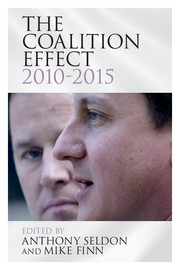Book contents
- Frontmatter
- Contents
- Contributors
- Acknowledgements
- David Cameron as Prime Minister, 2010–2015: The verdict of history
- Part I The coalition and the government of Britain
- Part II The coalition and policy
- 6 The coalition and the economy
- 7 The coalition and energy policy
- 8 The coalition and infrastructure
- 9 The coalition and society (I): Home affairs and local government
- 10 The coalition and society (II): Education
- 11 The coalition and society (III): Health and long-term care
- 12 The coalition and society (IV): Welfare
- 13 The coalition and foreign affairs
- 14 Europe: The coalition's poisoned chalice
- 15 ‘What the coalition did for women’: A new gender consensus, coalition division and gendered austerity
- 16 The coalition and culture: ‘Bread, circuses and Britishness’
- Part III The coalition and political culture
- Part IV Conclusion
- Index
15 - ‘What the coalition did for women’: A new gender consensus, coalition division and gendered austerity
Published online by Cambridge University Press: 05 April 2015
- Frontmatter
- Contents
- Contributors
- Acknowledgements
- David Cameron as Prime Minister, 2010–2015: The verdict of history
- Part I The coalition and the government of Britain
- Part II The coalition and policy
- 6 The coalition and the economy
- 7 The coalition and energy policy
- 8 The coalition and infrastructure
- 9 The coalition and society (I): Home affairs and local government
- 10 The coalition and society (II): Education
- 11 The coalition and society (III): Health and long-term care
- 12 The coalition and society (IV): Welfare
- 13 The coalition and foreign affairs
- 14 Europe: The coalition's poisoned chalice
- 15 ‘What the coalition did for women’: A new gender consensus, coalition division and gendered austerity
- 16 The coalition and culture: ‘Bread, circuses and Britishness’
- Part III The coalition and political culture
- Part IV Conclusion
- Index
Summary
Introduction
One image – the all-male coalition frontbench of 2014/15 – and three little words – ‘calm down dear’ – will likely come to epitomize the 2010–15 Conservative/Liberal Democrat coalition's regard for women and gender equality. The former embodies the maleness of the government; the latter symbolizes the masculinized nature of its politics. Since its very inception, the coalition has been dogged by questions of women and gender equality. Two dominant tropes stand out. First, the coalition's austerity politics are accused of having a disproportionate and negative impact on women – as consumers, users and employees of the welfare state. Second, and linked, the coalition, and especially the Conservatives, are said to have struggled to attract the woman voter. That said, any serious account of what the coalition ‘did for women’ has to be more nuanced. Since 2010, individual coalition policy developments and legislative interventions have, in many instances, opened up opportunities for women; offering women greater choice. These include: greater flexibility in parental leave; the right to request flexible working, now available to all employees; greater state support in the tax system for childcare; and various measures taken, domestically and internationally, to address women's health, and violence against women (VAW). The commitment to protect NHS funding and overseas aid – the coalition made a firm commitment to retain the outgoing Labour government's pledge to allocate 0.7 per cent of GNI to development spending for example – had a significant gender dimension. Collectively, these priorities and interventions arguably constitute evidence of a wider diffusion of liberal feminist values in British politics and society.
Such a development should not, in all respects, be that surprising given that the coalition followed the most feminist governments to-date, the New Labour years of 1997–2010. By 2010 a cross-party gendered marketplace in British politics was established: all the three main parties explicitly competed over a ‘women's terrain’.
- Type
- Chapter
- Information
- The Coalition Effect, 2010–2015 , pp. 397 - 429Publisher: Cambridge University PressPrint publication year: 2015
- 2
- Cited by



